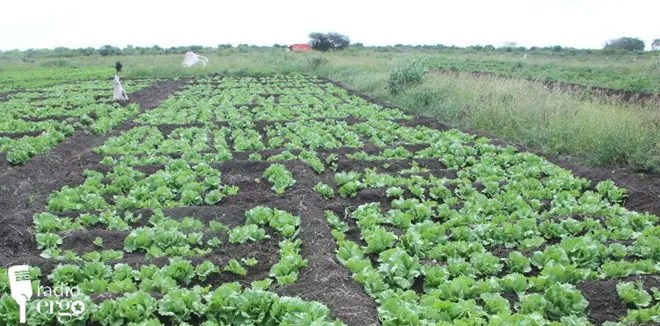
Tuesday April 16, 2024

Farmers in Somalia planted their after years of drought cycles/File Photo
(ERGO) – Former central Somali pastoralist, Abdirisak Jama Ali, has been selling his first harvests of maize, beans and vegetables to residents in Abudwak and neighbouring Balanbale. He’s already made $770 from the sales since early March.
Most of Abdirisak’s livestock perished at the height of the 2018 drought and he and his family of six children had been struggling with food insecurity, until an aid package offered to this severely drought-hit community converted them to farming.
Abdirahman and his family own a nine-hectare farm in Geesa-weyn, four kilometres from Abudwak. He is among 133 families who were given skills training, farming equipment and seeds in August 2023 by local NGO, HIRDA, with support from the UN’s World Food Programme.
He cultivated the land last September and October and planted watermelons, mangoes, guavas, onions and pepper. He now has enough money to buy the other items his family needs.
“Now we’ve been able to buy 12 kilogram of rice and 10-12 kilograms of sugar and we are getting enough food to cook in the morning, during the day and at night. We eat beans and rice and sometimes we grind the beans and use it to make porridge for the children,” he said.
Thanks to his improved income, Abdirahman cleared $450 debt that he had been struggling to repay. Only 20 goats from his original herd of 170 survived the drought, and he says he plans to stick to farming.
The training provided by experts from HIRDA proved very important for Abdirhaman, who had no experience of farming at all.
“I learnt how to plant the seeds, and how to cultivate the land. I also took training on working on the farm, for example I never knew how to grow onions, and I had never even seen a place where onions were being grown!” he said.
Abdirisak uses part of his income to pay $80 tuition fees for his four older children at Shire Jama School. Previously his relatives helped him pay for the children’s education.
Another former pastoralist, Mohamed Liban Juun, has been growing a similar range of fruit and vegetables on his three-hectare farm. It has provided him and his family with a stable income.
“I pay my children’s school fees, and their medical bills. Sometimes I get to help my impoverished relatives, or just donate to poor people,” said Mohamed, who earned $690 from his farm this season.
He has already paid off $400 of the $1,100 debts he accrued whilst having to buy food on credit from local stores and is convinced that farming will bring them a more secure future.
Mohamed estimates he could get $4,000 from his farm. Besides providing a living for his family, his drought hit livestock have also found fodder in the farm. Mohamed plans to expand his farm, since he has the experience he needs.
The head of the farmers’ association, Fu’ad Mohamed Warsame, said the association had been instrumental in reaching out to the aid organisations and they felt lucky to have gained this support.
Pastoralists who lost their livestock to drought were selected to benefit from the training and farm equipment.
“These people are mostly nomadic pastoralists in the rural outskirts. There are some people who lost their livelihoods, this was a motivation for them to try farming and get a living from their land,” he said.
He noted that more equipment and pesticides would be needed to enable the potential expansion of the farms, as the land was suitable for the farming of cash crops such as avocados, which were not grown in many parts of Somalia.